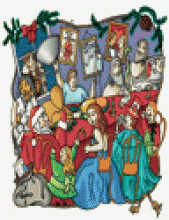Urban myth has it that if you put a frog in a pot of boiling water it will instantly leap out. But if you put it in a pot filled with pleasantly tepid water and gradually heat it, the frog will remain in the water until it boils to death. Allegedly, the frog is not able to detect the gradual increase in temperature until it's too late.
This allegory is frequently used in economics, business and marketing to point out that change has to be introduced gradually if it is to be successful. It also illustrates an aspect of human psychology: we tend to accept things that creep up on us slowly but steadily, even when they take control of our lives. But one day we wake up and find ourselves in boiling water. And such is the nature of excess.
In this holiday issue we take a look at various excesses in the medical sphere. Marcia Angell1 writes about the over-the-top habits of the pharmaceutical industry (page 1451); Mary Seeman2 (page 1477) takes an historical look at excesses in psychiatric care in the 1960s; medical student Farrah Mateen3 (page 1466) looks at the excessive achievement, but insufficient social representation, reflected in entrants to medical school; while a distinguished educator, Eugene Stead,4 poses fundamental questions about the historical monopoly of medical school education (page 1465).
And our contributors look, whether playfully or seriously, at excesses in other forms. Understanding how pharmaceutical advertisements resonate with the consumer within us and steer our behaviour, Steven Shumak and Donald Redelmeier5 offer a lesson in how to “read” drug ads so that we are in a better position to make an informed decision before we buy (or prescribe) a new product that promises to help us downsize our waistline, cholesterol level, blood pressure, pain, thoughts or emotions (page 1455). If our expectations of what pharmaceutical products can do for us is excessive, so too, for Steven Lewis,6 are our expectations for the whole of health care. But at the end of the day, he soberly reminds us, we're still not getting much healthier, despite adding billions every year to the health care tally (page 1449).
Is all this excess a sign of prosperity and material success? We eat not because we're hungry, but because food is available and affordable. We buy not from need, but because we want to possess. Why should we be happy with the nose we were born with when we can operate on it — more than once? Why should we have only one car when we can have three? Why should we live in an apartment when we can have a house? As a friend says: he who dies with the most toys, wins.
We selectively decide what is and is not an excess. We have obesity on one hand; anorexia on the other. Both are growth industries. Our Gaussian curve is narrowing; the area outside the realm of normality is widening. Some, such as Joan Johnston,7 would argue that our reaction to the obesity epidemic is in itself excessive (page 1459).
This is the time of year we go on shopping sprees to buy 25-pound turkeys, 10-pound boxes of chocolates, a two-four of beer or three and a carload or two of assorted presents. That pre-Holiday mania is followed by post-Holiday depression: financial and emotional. There may be a way to mitigate the latter. We are surrounded by an overabundance while others live in a continual deficit of food, clothing and water. It's not that there aren't enough resources for all; it's a question of unequal distribution. Perhaps we should consider balancing the scales. We could buy a goat for a half-starved family in a village in Sierra Leone instead of buying another silk tie for Dad. These sorts of efforts help to restore the balance, widen the Gaussian curve. If we don't, the holiday season will soon be come a classifiable disease and we'll be taking Noelones to help us through. — CMAJ











